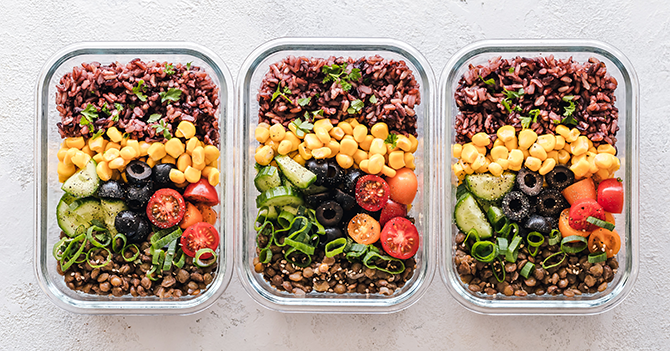Gluten Free BBQ Sauce Recipes That Even Meat-Eaters Will Love
Gluten Free BBQ Sauce Recipes That Even Meat-Eaters Will Love
Blog Article
Everything About Healthy Food: Benefits of Taking On Plant Based Alternatives
The conversation surrounding plant-based diet plans has actually acquired considerable attention in current years. Many people are checking out the potential health advantages, dietary benefits, and environmental effects connected with these nutritional options. As people end up being extra familiar with their food's impact on wellness and sustainability, inquiries occur regarding the functionalities of embracing such a way of living. What certain adjustments can one expect, and how might these options reshape not just individual health however also the earth's future?
Recognizing Plant-Based Diet Plans
Although many individuals connect plant-based diet regimens primarily with vegetarianism or veganism, these diet plans can include a large range of consuming patterns that prioritize entire, minimally processed plant foods. Such diets usually include fruits, vegetables, whole grains, vegetables, nuts, and seeds, while getting rid of or limiting pet items. This adaptability enables individuals to tailor their dietary selections according to personal preferences and nutritional needs. Some might take on a mainly plant-based diet while still occasionally consuming meat or milk, frequently referred to as a flexitarian technique. The focus continues to be on including even more plant foods, which can result in a varied array of dishes and flavors. Recognizing these different analyses of plant-based consuming is important for valuing its ease of access and charm in contemporary food culture.
Health And Wellness Benefits of Plant-Based Foods
The health advantages of plant-based foods are considerable, providing a nutrient density benefit that supports general wellness. Research suggests that these foods can boost heart health and play a vital duty in reliable weight management. By incorporating a lot more plant-based options, individuals might improve their dietary choices and promote long-term health and wellness.
Nutrient Thickness Advantage
Nutrient density plays an important duty in the wellness advantages of plant-based foods, making them an engaging selection for those seeking a balanced diet plan. Plant-based foods, such as fruits, veggies, vegetables, nuts, and entire grains, are often abundant in important vitamins, minerals, and anti-oxidants while being reduced in calories. This high nutrient density enables people to take in fewer calories while still fulfilling their nutritional needs. Additionally, these foods are packed with dietary fiber, advertising digestive wellness and assisting in weight management. By including nutrient-dense plant-based choices, consumers can boost their general wellness, support their immune systems, and lower the danger of chronic conditions. Ultimately, the nutrient thickness of plant-based foods underscores their relevance in a health-conscious way of life.
Heart Wellness Renovation

Weight Administration Support
In addition to promoting heart health and wellness, a plant-based diet plan can considerably assist in weight management. This nutritional approach emphasizes whole foods such as fruits, veggies, vegetables, nuts, and whole grains, which are usually reduced in calories and greater in fiber compared to animal-based items. The high fiber material helps increase satiety, decreasing general calorie intake. Plant-based diet plans are frequently abundant in vital nutrients while reduced in undesirable fats, making it much easier to maintain a healthy weight. Study suggests that people who adopt a plant-based way of living tend to have lower body mass indexes (BMIs) and experience even more effective weight management compared to those who eat meat-heavy diet regimens. As a result, welcoming plant-based alternatives is a strategic selection for effective weight monitoring
Nutritional Value of Plant-Based Ingredients
Plant-based components are abundant in important nutrients, offering a varied selection of vitamins, minerals, and antioxidants that add to overall wellness. A comparison of protein resources exposes that while pet items are frequently deemed exceptional, several plant-based alternatives give sufficient healthy protein and various other advantageous compounds. Understanding the dietary value of these active ingredients can aid people make informed nutritional selections.
Essential Nutrients in Plants
Nutrient-rich active ingredients discovered in plants offer a varied variety of vital vitamins and minerals that add considerably to total health and wellness. These active ingredients are abundant in vitamins A, C, and K, which sustain immune function, vision, and blood clot, respectively. In addition, plants give vital minerals such as potassium, magnesium, and calcium, important for heart wellness, muscle feature, and bone strength. The existence of fiber in plant-based foods aids digestion and promotes a healthy and balanced gut microbiome. Anti-oxidants, located generously in vegetables and fruits, aid combat oxidative anxiety and decrease inflammation. Additionally, several plant foods are reduced in calories yet high in nutrients, making them an excellent selection for those looking for to maintain a healthy and balanced weight while making sure suitable nutrient consumption.
Comparing Protein Sources
Protein sources vary considerably in their dietary accounts, with plant-based components using distinct advantages. Unlike animal healthy proteins, which frequently consist of hydrogenated fats and cholesterol, plant proteins have a tendency to be reduced in these harmful elements. Legumes, nuts, seeds, and entire grains are rich in necessary amino acids, fiber, vitamins, and minerals. For example, lentils give high protein material along with significant iron and folate, while quinoa is a complete protein, using all 9 necessary amino acids. In addition, plant-based proteins are frequently gone along with by anti-oxidants and phytochemicals that sustain general health and wellness. The shift to plant-based protein resources not only improves dietary intake however also straightens with lasting nutritional techniques, reducing ecological influence and advertising long-lasting wellness advantages.
Environmental Impact of Plant-Based Consuming
As recognition of climate change grows, many individuals are discovering sustainable nutritional choices that can substantially minimize their ecological impact. Plant-based eating has become a significant contributor to lowering greenhouse gas emissions, which are mainly connected with livestock production. The farming of fruits, grains, beans, and vegetables usually calls for fewer sources, such as water and land, compared to animal farming. Additionally, plant-based diet plans i loved this can cause decreased deforestation, as less land is needed for grazing animals or expanding pet feed. By moving in the direction of plant-based choices, customers can sustain biodiversity and advertise healthier communities. On the whole, accepting plant-based eating not only benefits individual health yet also represents a crucial action toward ecological sustainability and preservation initiatives.
Overcoming Common Misconceptions
While numerous individuals acknowledge the advantages of a plant-based diet regimen, a number of false impressions usually discourage them from totally welcoming this way of life. A common belief is that plant-based diets do not have enough protein; nevertheless, countless plant sources, such as vegetables, nuts, and tofu, supply enough protein. Furthermore, some think that this diet plan is costly, when in reality, staples like beans, rice, and seasonal vegetables can be quite affordable. An additional false impression is that plant-based eating is excessively restrictive, whereas it in fact supplies a diverse array of tastes and foods. Several stress that a plant-based diet regimen might lead to deficiencies, yet with correct planning, individuals can get all required nutrients, consisting of minerals and vitamins, while taking pleasure in a wide selection of delicious dishes. Vast Tips for Transitioning to a Plant-Based Lifestyle
Making the change to a plant-based way of living can be an improving experience, though it commonly needs some support to navigate the first changes. First, individuals are motivated to begin progressively, integrating even more fruits, vegetables, beans, and whole grains right into their meals while decreasing meat and milk intake. Dish preparation is vital; preparing a regular food selection can assist relieve the modification and avoid last-minute undesirable choices. Discovering brand-new recipes and cooking techniques can additionally improve the experience and keep enjoyment concerning plant-based consuming. In addition, joining support groups or areas can provide inspiration and share useful tips. Lastly, staying notified concerning nourishment assurances balanced meals, avoiding shortages while cultivating a healthy and balanced, gratifying plant-based way of living.
Delicious Plant-Based Meal Ideas
Discovering tasty plant-based meal concepts can influence individuals to welcome a much more nutritious diet regimen. One prominent alternative is a hearty quinoa salad, including cherry tomatoes, cucumber, and a zesty lemon-tahini dressing. An additional fave is a tasty lentil stew, packed with carrots, celery, and fragrant herbs, ideal for a soothing dinner. For breakfast, overnight oats made with almond milk, chia seeds, and topped with fresh berries provide a nutritious beginning to the day. In addition, a vibrant vegetable stir-fry with tofu and a variety of vivid veggies can be a quick yet pleasing dish. Finally, velvety avocado salute on whole-grain bread, sprayed with seeds and spices, provides a straightforward yet savory snack. These meals showcase the variety and richness of plant-based consuming.

Often Asked Concerns
Can a Plant-Based Diet Plan Give Enough Healthy Protein?
The inquiry of whether a plant-based diet plan can provide adequate healthy protein is usual. Various sources, consisting of legumes, nuts, seeds, and entire grains, can meet healthy protein requires successfully, supporting a balanced and nourishing diet regimen for people.
Are Plant-Based Diet Regimens Suitable for Kid?
The viability of plant-based diet regimens for kids depends upon mindful planning. Appropriate nutrients must be ensured, including healthy proteins, vitamins, and minerals. With proper advice, such diet plans can support healthy development and advancement in children.
How Do I Eat in restaurants on a Plant-Based Diet regimen?
Dining out on a plant-based diet regimen includes seeking dining establishments with varied food selections, asking for modifications, and exploring vegan-friendly options. Planning ahead and connecting dietary choices can enhance the eating experience while maintaining dietary choices.
What Are Usual Allergens in Plant-Based Foods?
Usual allergens in plant-based foods include soy, gluten, nuts, and seeds - Plant Based Chicken. People complying with a plant-based diet plan must know these irritants and read tags thoroughly to prevent unfavorable reactions and assure safe usage
Can Plant-Based Diets Assist With Weight Loss?
Research shows that taking on a plant-based diet might help with weight reduction because of its usually lower calorie thickness and higher fiber material. This combination can boost satiation, aiding individuals handle their calorie consumption properly. Many people connect plant-based diets mostly with vegetarianism or veganism, these diet regimens can include a broad variety of consuming patterns that focus on entire, minimally refined plant foods. Nutrient density plays an essential role in the wellness advantages of plant-based foods, making them a compelling choice for those looking for a balanced diet regimen. Plant-based diet regimens have like this been shown to significantly improve heart wellness, as they usually include aspects that sustain cardio feature. In addition to advertising heart wellness, a plant-based diet regimen can considerably aid in weight administration. An usual idea is that plant-based diet plans do not have sufficient healthy protein; nevertheless, numerous plant sources, such as beans, nuts, and tofu, offer More hints enough healthy protein.
Report this page